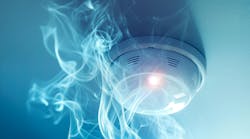Brian Johnson, an Ennis, Texas, senior at Baylor University, will be the first to say that fires are no joke. Johnson and his three roommates were displaced in 2004 after their Baylor Plaza apartment caught fire. Johnson said the fire originated in the apartment next door with a sparking bathroom fan.
"We went outside, saw the fire and went back to try to get our stuff," Johnson said.
Since their room smelled like smoke, Johnson said his roommates and he had to live in Brooks Residence Hall for about nine days. He said Baylor bought them new clothes since they had to take everything to the cleaners.
Although Johnson and his roommates were not injured, not everyone is as lucky.
According to the Center for Campus Fire Safety, a nonprofit organization dedicated to preventing campus fire issues, 89 students have died and hundreds more have been injured nationwide in the last six years because of fires, both on and off campus.
Many student-related fires involve a disabled smoke alarm, careless disposal of cigarettes and lack of automatic sprinklers.
Baylor's risk management department has several regulations in place in order to ensure the safety of residents. Candles, extension cords and live Christmas trees are prohibited in the residence halls.
If a student is caught with any prohibited items, he or she may be required to meet with a risk management representative. In some cases, students could face termination of their housing rights.
Fire Marshal Leigh Ann Moffett said she teaches residential staff members how to use a fire extinguisher correctly and how to respond appropriately to a potential fire.
Moffett also said if students see smoke or fire, they should immediately activate the fire alarm system and evacuate the building.
"What people fail to realize is that the fire itself isn't necessarily what will kill a person, it's the smoke. Although they may not see the fire, smoke spreads fast," Moffett said.
Each residence hall conducts one unannounced fire drill at the beginning of the semester. If residents fail to evacuate the building during the alarm, they could face $100 fines, according to the Baylor fire safety policies.
"Unfortunately, false alarms do occur sometimes from people intentionally tampering with equipment or people spraying too much air freshener," Moffett said.
Some apartment complexes, such as the Arbors, Baylor Plaza, Cottonwood and Speight-Jenkins are upgrading fire safety by installing wireless smoke detectors.
Moffett said these smoke detectors are just like battery-operated ones, except they send a signal to the fire alarm panel for immediate response.
University Rentals Property Manager Joe Phipps Jr., said most apartment fires start in the kitchen.
For instance, a student might be frying bacon. If he or she happen to leave the stove unattended, there could be a potential grease fire, Phipps said.
He said he always advises tenants to always make sure their smoke alarms are working properly and consider getting renter's insurance.
Even though the apartment's insurance will usually cover damages when a student starts a fire, renter's insurance can provide a safety net for liable students, Phipps said.
(C) 2006 The Lariat via U-WIRE


